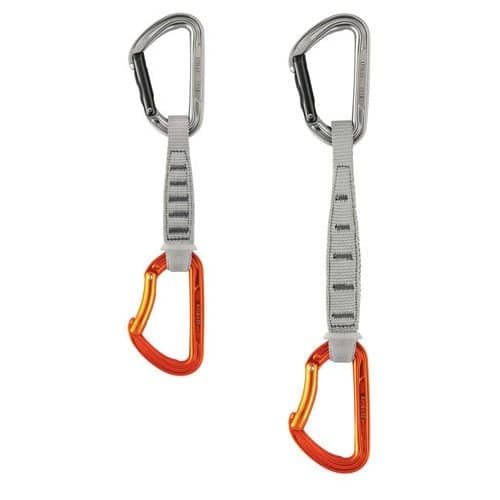Petzl ushered in the era of “notchless” keylock carabiners, and this design has really set one of the most important performance standards for carabiners. Keylock carabiners typically aren’t the lightest carabiners on the market, but they compensate for their relatively heavy weight by providing great clip-ability and a snag-free operation.
Before the invention of keylock carabiners, it was standard for gates to incorporate a tiny crossbar at the gate’s end, which would then hook onto a little “notch” carved out of the carabiner’s nose. When a load was placed on a carabiner and the carabiner stretched, the crossbar and notch interlocked and prevented the carabiner from opening.
The problem with this standard design was the tendency for the notch to snag on various things—everything from harness gear loops to nut wires to bolt hangers. The “notchless” keylock carabiner design solved this problem by eliminating the notch/crossbar design and instead relying on a design where the gate and notch fit together like two three-dimensional jigsaw puzzle pieces—a smart, elegant solution that made keylock carabiners desirable for everything from racking nuts to using on the bolt-end side of a sport-climbing draw.
For many years, the Petzl Spirit was considered the premier sport-climbing quickdraw. The beefy dogbone (nylon sling) and two keylock carabiners on either end (with the rope end incorporating a slightly bent gate for easier rope clipping) set the bar for sport-climbing draws.
Recently, Petzl updated their legendary sport draw with the Spirit Express, making a few small adjustments that have slightly reduced the weight, slightly improved the functionality, and most importantly remained true to all the aspects that made the original Spirit draw such a classic.
Like the old version, the Spirit Express has a straight-gate carabiner on one end and a bent gate on the other. Each carabiner is 10 grams lighter than its original counterpart thanks to the “H-shaped profile.” So, if you’re carrying a standard rack of 12 quickdraws up a sport climb, you’ll save a total of half a pound by using the new Spirit Express. That’s great, but it also probably won’t make or break your climb.
The draw comes in two lengths: 12cm and 17cm (a measurement referencing the length of the dogbone). Each draw weighs 93 and 100 grams, respectively. A rack of 12 Spirit Express quickdraws in the 12 cm length will add a mere 2.5 pounds to your rack. Not a lot, but picky ounce-counters might want to look elsewhere; there are many lighter quickdraws on the market.
The reason to buy the Spirit Express, however, is not the savings in weight but the increase in functionality. I’ve been testing a rack of these quickdraws over the last 9 months, and I love how easy it is to rack them on a harness, clip them to both bolts and cam slings, and clip the rope through the bottom gate. The low-profile keylock nose can also fit through old piton eyeholes, unlike the Black Diamond Hoodwire design (a unique wire-gate carabiner with “keylock” properties that is also a great carabiner in all aspects except for the fact that it can’t fit the eyehole of most pitons).
The Express polyester sewn sling is very stiff, which makes it easy to clip the quickdraw to just-out-of-reach bolts. And it offers a nice handhold for when you need to grab the draw.
Overall, the Spirit Express has become my favorite quickdraw for both sport and trad climbing. If I had to make a recommendation in terms of choosing sizes, I’d opt for a 50/50 split between 12cm and 17cm lengths.
While you can order individual 12cm slings for $4.95, it would also be great for Petzl to offer Spirit Express in a 21cm or even 30cm size for steep or traversing sport climbs when you need extended slings.




Recent Comments